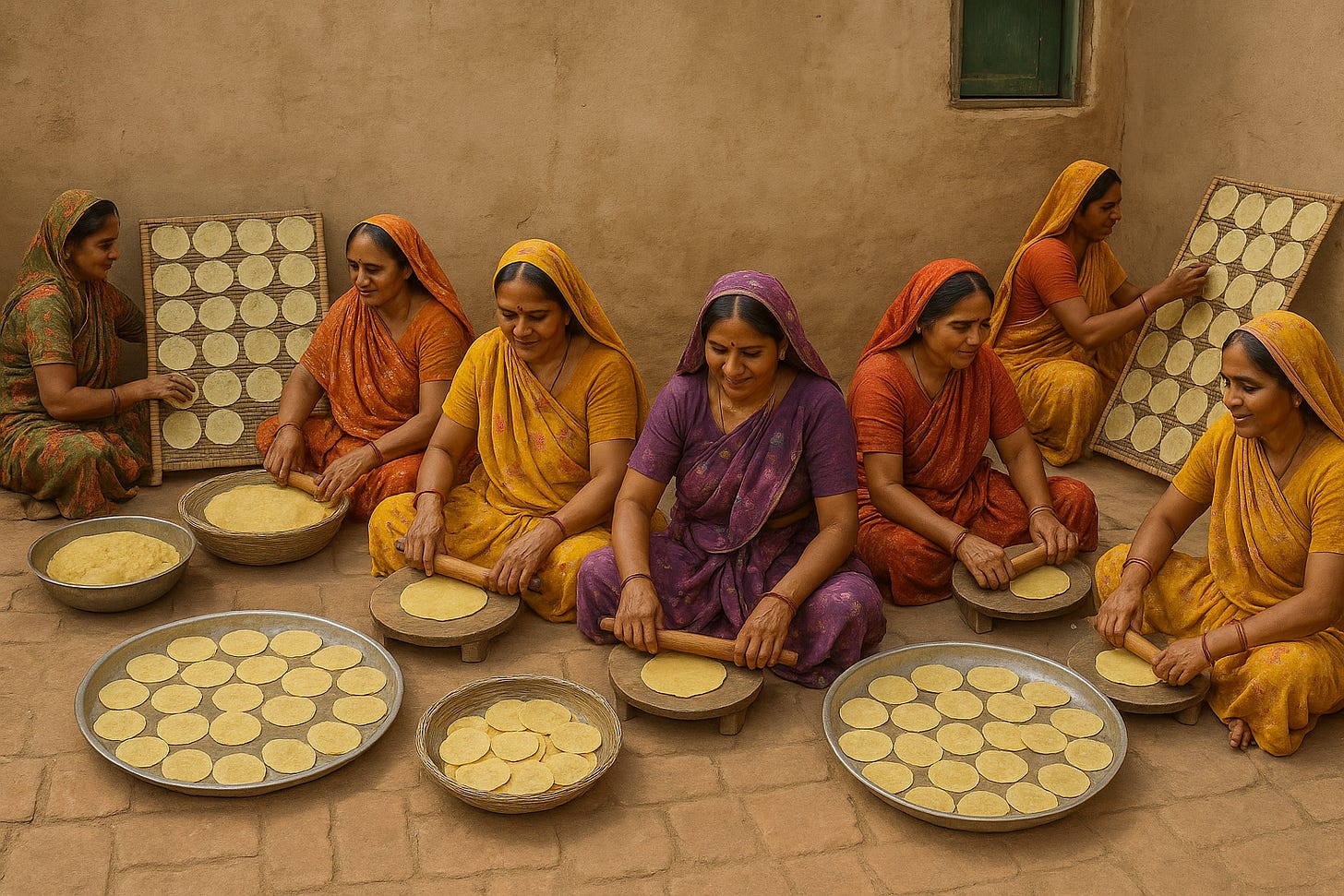Dear Reader,
If you live in India or are Indian, you probably know what Papad is. And you probably have also heard of Lijjat Papad. It is arguably the biggest brand of Papad in the country.
It is inspiring how Lijjat Papad came into being.
PS - You can also hear the audio version of this on Spotify.
One summer afternoon, seven women from a housing society in South Mumbai gathered to find a source of income to supplement their husbands’ incomes. Their limited education and resources limited their options, so they decided to do what they knew best. Cooking. Within cooking, they focused on just Papad.
The Seven Sisters started out with an 80-Rupee loan from a social worker, Mr. Chhaganlal Karamsi Parekh. On 15 March 1959, for the first time ever, the Seven Sisters rolled out four packets of Papad, which they sold to a local merchant. Their Papads started selling out quickly. Customer demand was growing. They started enrolling more women into their venture to increase production.
Within three months, they were a group of 25 women. They were growing by leaps and bounds. By the second year, almost 150 women were working at Lijjat, and by the third year, the number had gone to 300.
As more member-sisters joined in, Lijjat diversified into other products in the 1970s. Spices, ready-mix dough, wheat flour, and even bakery products. It also launched a few unsuccessful products, such as incense sticks and leather products.
Then, in 1988, Lijjat entered the soap market with Sasa detergent and soap. It is a popular brand of detergent even today.
Through all the growth and expansion, it stayed true to its core philosophy. Mr. Parekh, the social worker who had given them a seed loan of 80 rupees, had advised the Seven Sisters never to accept any charity or donation for their venture. He wanted them to be responsible for their profits as well as losses.
It is such sage advice, isn’t it?
To date, Lijjat Papad has never accepted any charity or donation. They don’t even accept voluntary help. But hey, don’t confuse it to be a profit-driven organization.
Its purpose is to empower more and more women by providing them livelihoods. The 45000 women who work across 83 branches of Lijjat are not its employees. They are all member-owners. There are no salaries. Member-sisters make money when the branch makes money, they lose money when the branch does not do well. Usually, the member sisters make roughly 10000 rupees per month.
The top management, branch managers, and even division managers are all women. They are all stakeholders in the business. The members don’t make handsome amounts of money, but they make decent sums to live a dignity-filled life.
What is surprising is how efficiently the business is run at a national level by a group of women who mostly come from underprivileged backgrounds. They have a well-planned organizational structure, operations, and distribution flow.
Raw material collection largely happens at the headquarters in Mumbai. Raw materials are then distributed to all 82 branches, ensuring consistency in quality. The branches then distribute the dough to the member-sisters, who make the papad in their individual homes. They are given one kilogram of dough daily, and they have to bring back at least 800 grams of rolled papad the next day.
Member sisters who do not have enough space in their homes to make and dry papad can help with other operational activities such as collecting, sorting, assorting, packaging, accounting, etc.
Papads collected by the branch are packed and dispatched to depots, which act as pick-up points for distributors. Distributors pay an upfront fee to get exclusive distributorship of designated areas. They do not get any credit period. They have to pay right when they pick up the Papad. That’s how Lijjat ensures that the member sisters are paid every day.
The management usually has a fair estimate of how much a distributor will take in a day and plans inventory accordingly. This system ensures they do not accumulate inventory or incur storage costs.
Mind you, these systems were not built recently. Most of what I narrated, I found it in various media stories written fifteen-twenty years ago.
The seven founding sisters have all passed away, but Lijjat still swears by the guiding principles laid down by them.
Lijjat Papad is a masterclass in building a sustainable organization that does not focus on profits but still runs with immense financial discipline.
This newsletter has been put together by Apurva Gururaj and @Vineet_Rajani . If you have any feedback for us or something you’d like for us to cover in the upcoming newsletters, do let us know. Mail us at [email protected]

